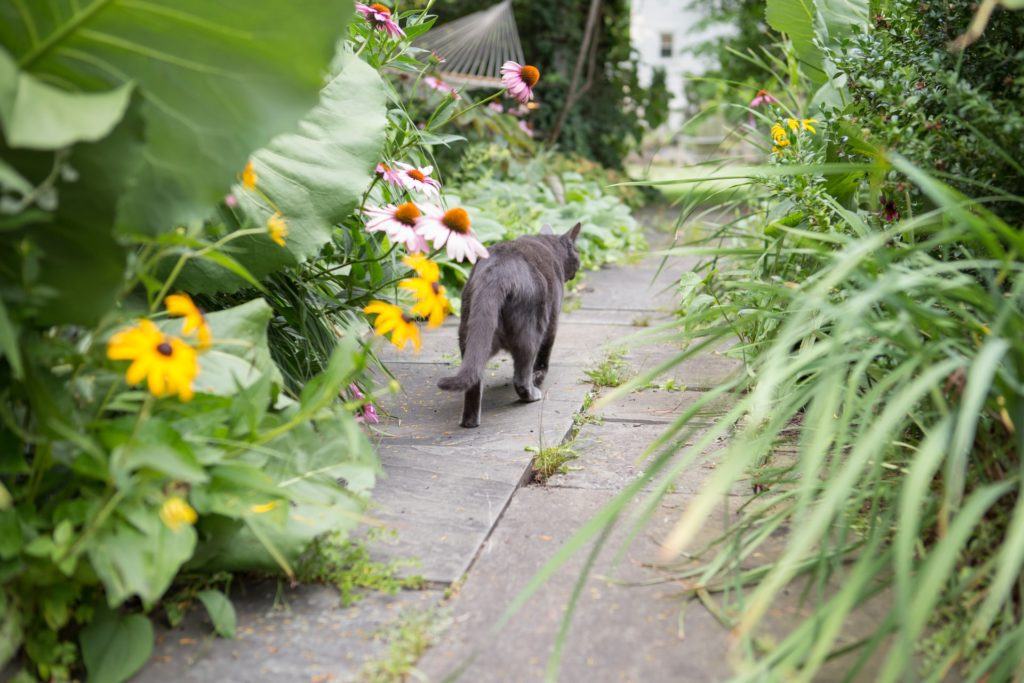
Kitties digging in your garden can be a nuisance and a serious health risk (due to the spread of toxoplasmosis in a proportion of cats’ feces). Maybe it’s even your own cat! (Photo: Felicia D'Ascanio via Unsplash)
Neighbourhood kitties digging in your garden can be a nuisance. Maybe it’s even your own cat!
Why are they a problem?
- Cats are carnivores. Their feces can contain parasites or pathogens not present in herbivore manure. This is concerning because most of us plan to eat the food we grow! (The same goes for dog poop.)
- Roaming domestic cats kill songbirds, about 140 million (birds and small animals) each year. And if you’re doing it right, your yard and garden are designed to attract pollinators, like hummingbirds, as well as other wild birds.
- Roaming cats can strain neighbourhood relations.
Try these solutions to keep cats out of your much-loved vegetable beds and away from the food you grow:
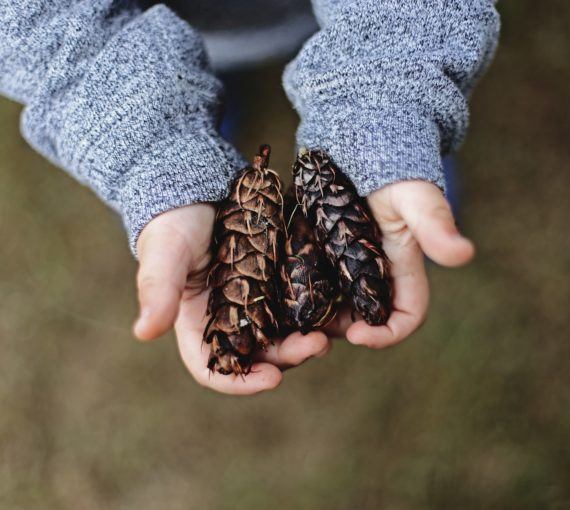
Prickly is best
Cats prefer to walk on soft, loose soil and will avoid prickly surfaces. Make your garden beds less inviting, or less like a litter box. Try these low-cost, upcycled and simple prickly solutions:
- Cover garden soil where cats frequent in twigs until your spring plants get established. Place them a couple of inches apart throughout the bed. Note: bundles of twigs help wild bees!
- Push pine cones or other prickly yard trimmings (maybe fall leaves) down into the soil around your plants. Stone mulch, eggshells, holly cuttings or repurposed plastic carpet runners with the nub side up are other options.
- Repurpose wooden chopsticks as garden stakes! Experiment with spacing. The idea is to put them at close enough intervals so kitty has a hard time turning around.
- Lay chicken wire or pieces of plastic fencing over soil. (Many plants will grow up through this!) Pieces of lattice on the ground may also work.
- Upcycle mesh produce bags from onions or potatoes by spreading them on the garden and anchoring with twigs or stakes. Increase the hole size around your budding plants if necessary. Tip: Keep an eye on any plastic materials you add to the garden so they don’t blow away and become litter.

Use scent to keep the cats away
- Cats dislike the smell of rue, lavender and pennyroyal, Coleus canina and lemon thyme. Plant a few of these throughout the garden. (Interplanting can attract pollinators and other beneficial insects too.)
- Cats steer clear of strong citrus scents. Throw peels directly onto garden soil.
- The scent of human hair is said to deters cats. Empty your brushes onto the garden and reclaim your territory! (Avoid mothballs; they’re toxic to cats and humans.)
- Commercial cat repellents copy the smells of predator urine. It’s advertised as non-toxic and organic, said not to harm plants. Do your research.
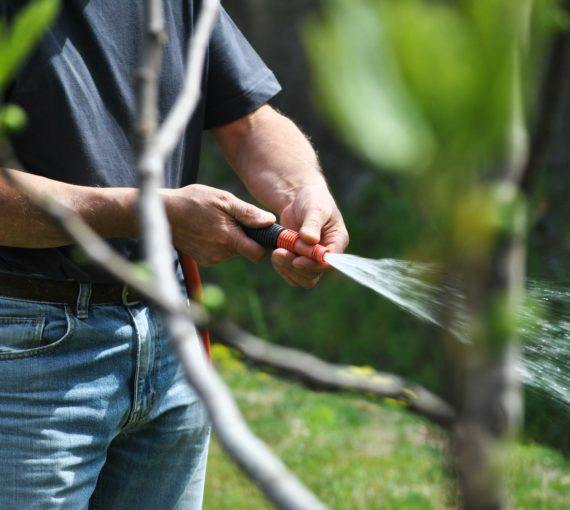
Wash up to deter garden cats
If your visitor has a favourite location, wash the area well with a hose (or water from your rain barrel) to remove the scent or urine spray. Boost your cleaning with eco-friendly liquid castile soap on doors, patio furniture, etc. Cats tend to choose the same spot repeatedly, so remove their previous claim to your garden to prevent repeat offences.

Fences
Create a barrier with wire-mesh fencing. Most recommend at least 1.8 metres high and 5.1 by 5.1 centimetre squares. An overhang makes it even better.
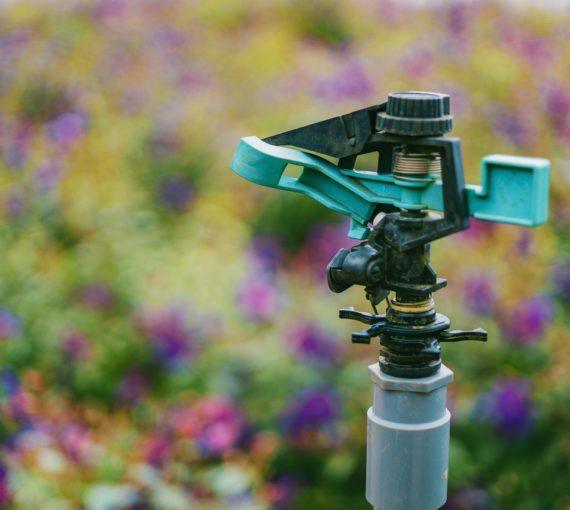
Water
A gentle misting with water from a spray bottle can help cats break the positive association with your garden. Motion-activated sprinkler systems can keep cats away, too. Just make sure you remember when they are on and obey guidelines during summer water shortages.

Sound
Try wind chimes, motion-sensitive bells or even rocks or pebbles in a jar that rattle when kitty comes near. There are also motion-activated devices and, in the case of ultrasound devices, emit a frequency that cats can’t stand but is inaudible to humans.
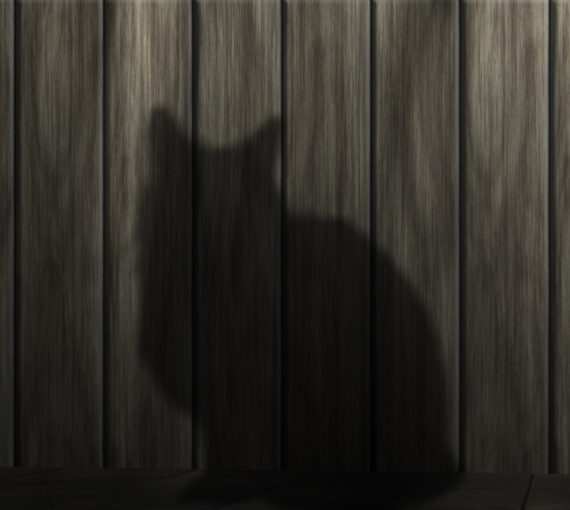
Create an outdoor litter box
Call it a peace offering? Cats love mint, honeysuckle and catnip. Place a small sandbox nearby. Sure you’ll need to clean up and properly dispose of cat waste, but it might help keep kitty — and her business — out of your veggies.
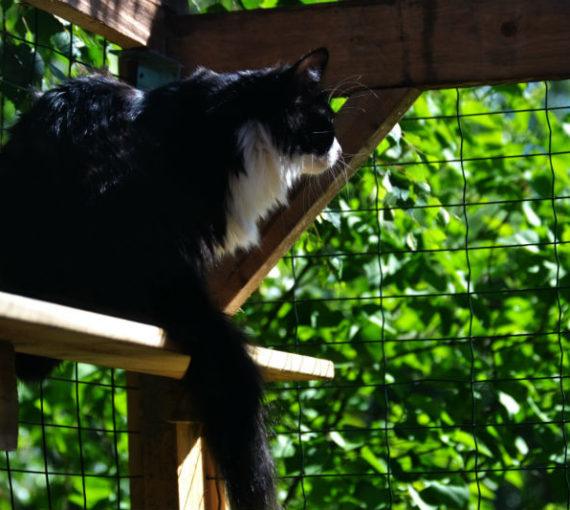
Build a “catio”
Assuming it’s your cat you need to deter, build an outdoor cat enclosure to save your garden, as well as birds and other wildlife.
Note: Problem with a feral cat? Contact your local animal shelter for help.



